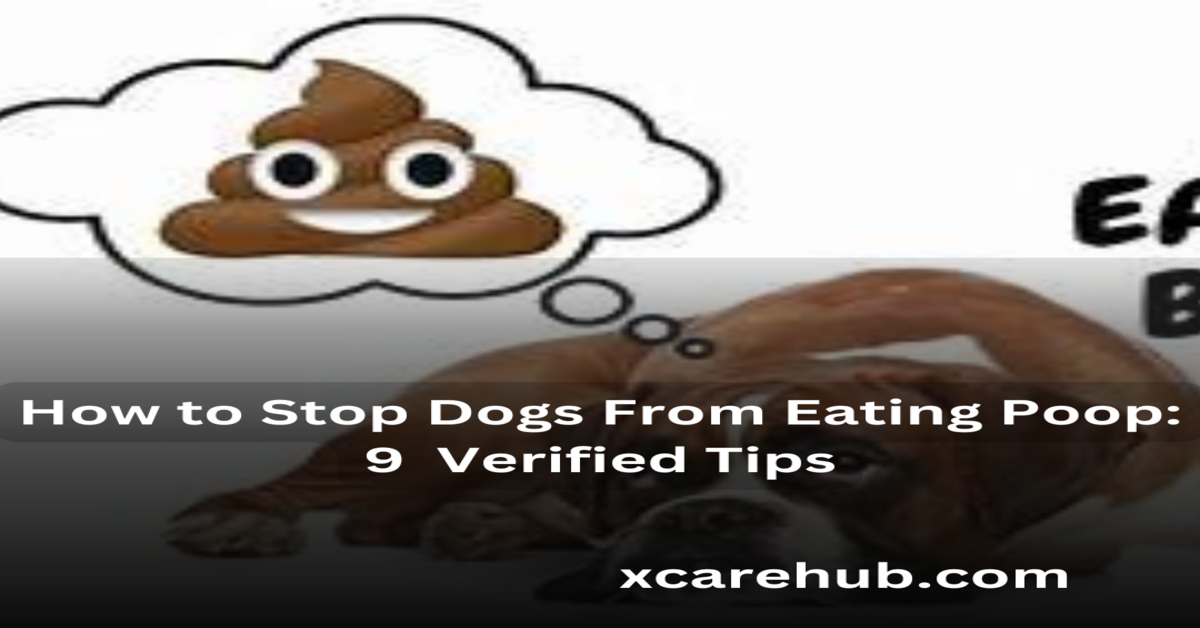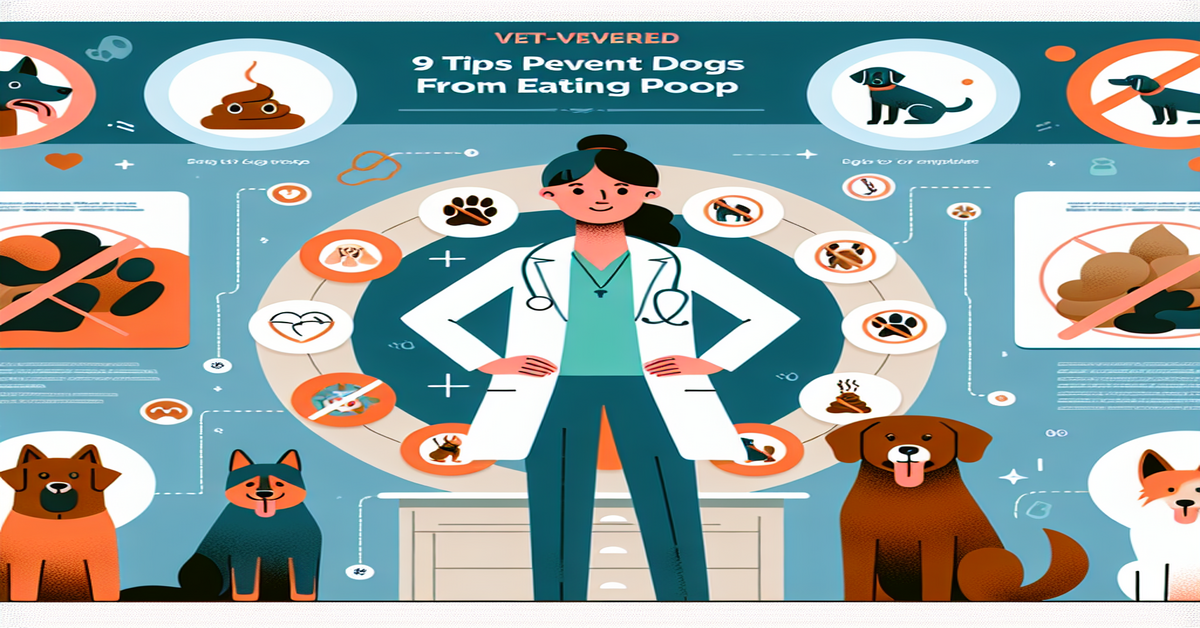Dogs are charming companions, but sometimes they have habits that leave us scratching our heads—or covering our noses. One of the most perplexing and unpleasant behaviors is coprophagia, or poop eating. If you’ve caught your dog indulging in this nasty habit, you’re not alone. Studies show that around 16% of dogs eat poop regularly. This behavior can pose health risks, including bacterial infections and parasites, making it crucial to address it promptly and effectively.
In this comprehensive guide, we’ll explore why dogs eat poop and provide nine vet-verified tips to help you stop this behavior.
Introduction
Natural behavior of coprophagia in dogs
Coprophagia, or poop eating, is a natural—though undesirable—behavior in dogs. Understanding its roots is key to curbing it. In the wild, ancestors of dogs may have engaged in this behavior to keep their dens clean and reduce the scent that could attract predators.
Statistics on poop eating in dogs
Research indicates that about 16% of dogs are regular poop eaters, while another 24% have tried it at least once. This behavior is more common than you might think, so don’t feel alone in dealing with it.
Risks of poop eating
Eating feces can expose your dog to harmful bacteria, parasites, and other pathogens. These risks can lead to gastrointestinal issues, infections, and in severe cases, more serious health complications.
Importance of addressing poop eating
Addressing coprophagia is crucial for your dog’s health and your peace of mind. By tackling this behavior, you can ensure your dog stays healthy and your home remains pleasant.
Reasons Why Dogs Eat Poop
Curiosity in puppies
Puppies are naturally curious and often explore their environment with their mouths. This can lead to the occasional tasting of feces as they learn about their world.
Mother dogs cleaning after pups
Mother dogs often eat their puppies’ feces to keep the den clean. This behavior can sometimes be mimicked by puppies, especially in multi-dog households.
Hunger, boredom, and health-related causes
Dogs may eat poop due to hunger or malnutrition. Boredom and lack of mental stimulation can also lead to coprophagia. Additionally, underlying health issues like malabsorption or parasites can trigger this behavior.

How to Stop Dogs From Eating Poop: 9 Verified Tips
9 Vet-Verified Tips for Preventing Poop-Eating
See Your Vet
A trip to the vet is the first step in addressing coprophagia. Your vet can check for underlying health issues such as nutritional deficiencies, malabsorption, dementia, or parasites that might be causing your dog to eat poop. Addressing these health concerns is crucial for curbing the behavior.
Limit Access to Poop
One of the simplest ways to prevent poop eating is to limit your dog’s access to feces. Clean up your yard promptly and ensure litter boxes are out of reach. Using barriers or gates can help keep your dog away from areas where feces might be accessible.
Consider a Muzzle
A muzzle can be an effective tool for preventing your dog from eating poop during walks. There are various types of muzzles designed specifically to prevent scavenging. Using a muzzle can give you peace of mind and make walks more enjoyable for both you and your dog.
Use Distraction Techniques
Distracting your dog when they show interest in feces can help break the habit. Call your dog’s name and offer a toy or treat to divert their attention. Be cautious if your dog is protective of their toys, and always supervise playtime to ensure safety.
Leash Your Dog
Keeping your dog on a leash gives you more control during walks. A leash allows you to steer your dog away from feces and other temptations. In open areas like parks or forests, using a longer leash can give your dog freedom while still maintaining control.
Check Your Dog’s Diet
Ensuring your dog has a balanced diet is crucial. Proper nutrition can reduce the likelihood of coprophagia caused by hunger or nutritional deficiencies. Consult your vet to determine the best diet for your dog and consider feeding smaller, more frequent meals to keep your dog satisfied.
Mentally Stimulate Your Dog
Boredom can lead to undesirable behaviors like poop eating. Providing your dog with adequate physical and mental exercise can help prevent boredom. Interactive toys, puzzle feeders, and regular playtime can keep your dog engaged and reduce the likelihood of coprophagia.
Teach a “Leave It” Cue
Training your dog to respond to a “leave it” command can be highly effective. Start by offering a treat and saying “leave it” when your dog shows interest in something off-limits. Reward positive behavior with treats and praise to reinforce the command.
Add Certain Foods to the Diet
Some theories suggest that adding certain foods to your dog’s diet can make feces less appealing. Pineapple, for example, is believed to change the taste of poop, deterring dogs from eating it. Always consult your vet before introducing new foods or supplements to your dog’s diet.

Why Do Dogs Eat Poop?
Puppy Behavior
Puppies are naturally curious and may eat poop as they explore their environment. This behavior is usually temporary and can be addressed with proper training and supervision.
Motherly Behavior
Mother dogs often eat their puppies’ feces to maintain a clean den. This instinctive behavior can sometimes be mimicked by puppies, especially in multi-dog households.
Hunger or Greed
Underfed dogs or those with low-quality diets may scavenge for food, including feces. Ensuring your dog receives proper nutrition can help prevent this behavior.
Boredom or Anxiety
Boredom and anxiety can lead to coprophagia as dogs seek attention or entertainment. Providing mental and physical stimulation can help curb this behavior.
Illness
Medical conditions that increase appetite, such as malabsorption or parasites, can cause dogs to eat poop. Regular vet checkups are essential to rule out health issues.
Breed, Type, or Sex
Certain breeds, like hounds and terriers, are more prone to poop eating. Spayed females are more likely than intact males to engage in coprophagia. Understanding your dog’s breed tendencies can help in addressing the behavior.
Multiple-Dog Households
In households with multiple dogs, the presence of additional feces can increase the likelihood of coprophagia. Keeping the environment clean and providing adequate supervision can help mitigate this behavior.

Extra 9 Verified Tips:
1. Dietary Adjustments
One of the first steps in addressing coprophagia is ensuring your dog receives a balanced diet. High-quality commercial dog foods are designed to meet all nutritional needs. Consult your vet to ensure your dog isn’t missing essential nutrients, which could be driving their behavior.
2. Regular Exercise
A well-exercised dog is less likely to develop bad habits out of boredom. Regular walks, playtime, and mental stimulation can reduce the likelihood of your dog eating poop. Consider puzzle toys and interactive games to keep their mind engaged.
3. Behavioral Training
Training is crucial in curbing coprophagia. Commands like “leave it” and “come” can be lifesavers. Positive reinforcement techniques, such as rewarding your dog for ignoring poop, can be effective. Consistency is key to making these commands second nature.
4. Clean Environment
Keeping your dog’s environment clean is another critical step. Promptly dispose of feces in your yard and on walks. The less opportunity your dog has to engage in the behavior, the easier it will be to break the habit.
5. Use Deterrents
Several commercial products are designed to make feces less appealing to dogs. These deterrents can be sprinkled on or mixed into your dog’s food to produce a bitter taste in their feces, discouraging them from eating it.
6. Vet Check-Up
Sometimes, coprophagia can be a symptom of underlying health issues. Regular vet check-ups can rule out medical conditions like gastrointestinal problems, diabetes, or thyroid issues. Addressing any health concerns is vital in resolving the behavior.
7. Increase Fiber Intake
Adding fiber to your dog’s diet can help. Fiber makes stools bulkier and less appealing. Pumpkin, sweet potatoes, and green beans are excellent natural sources of fiber. Always consult your vet before making dietary changes.
8. Stress Management
If anxiety or stress drives your dog’s coprophagia, addressing these emotional triggers is essential. Calming aids, anxiety wraps, and creating a more relaxed environment can help. Training sessions should be calm and positive.
9. Professional Help
Consulting a professional dog trainer or behaviorist can provide tailored strategies to curb coprophagia. These experts can assess your dog’s specific triggers and develop a personalized training plan.
The Importance of Consistency
Be Persistent
Consistency is the most crucial factor in breaking your dog’s habit of eating poop. Apply the suggested tips diligently, and avoid giving up too soon. Changes won’t happen overnight, but persistent effort will pay off.
Involve the Whole Family
Ensure that every family member is on board with the training and prevention strategies. Mixed signals can confuse your dog and slow progress. Consistent commands, rewards, and deterrents from everyone will reinforce good behavior.
Celebrate Small Wins
Recognize and celebrate small victories along the way. Each time your dog ignores poop or responds to a command, acknowledge their progress. Positive reinforcement encourages them to continue good behavior.

Conclusion
Curbing coprophagia requires patience, consistency, and a multifaceted approach. Always start with a vet checkup to address any underlying health issues. With proper care, training, and environmental management, you can effectively stop this behavior and ensure your dog’s health and happiness.
For more tips on dog behavior and health, consider reaching out to a professional trainer or joining a community of pet owners who share similar experiences. Together, you can provide the best care for your furry friend.
FAQs
Why does my dog eat poop even after being fed?
Dogs may eat poop due to habits formed from curiosity, boredom, or health issues. Even well-fed dogs can develop this behavior for various reasons.
Can coprophagia harm my dog?
Yes, eating poop can expose your dog to harmful bacteria, parasites, and pathogens, leading to health issues.
Are certain breeds more prone to eating poop?
Yes, some breeds like hounds and terriers are more prone to coprophagia. Spayed females are also more likely to engage in this behavior.
What should I do if my dog continues to eat poop despite my efforts?
Consult your vet to rule out any underlying health issues and consider working with a professional trainer to address the behavior.
Can adding certain foods to my dog’s diet stop poop eating?
Some foods, like pineapple, are believed to make feces less appealing to dogs. Always consult your vet before introducing new foods or supplements to your dog’s diet.
By understanding the reasons behind coprophagia and implementing these vet-verified tips, you can help your dog break this habit and enjoy a healthier, happier life.



